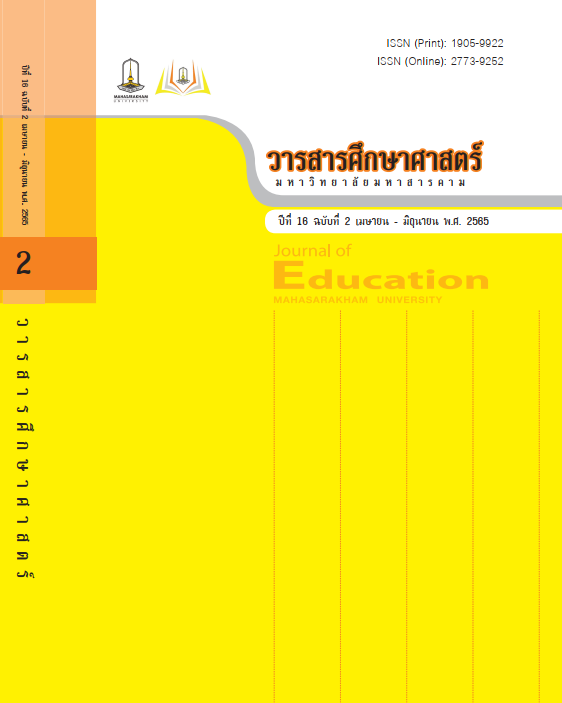The Developrment of Learning Achievement of Science and Modern Technology on Definition and importance of science and technology of Kalasin University’s Students through Peer Tutoring Learning Method
Main Article Content
Abstract
The purposes of this study were to: 1) develop the lesson plan on meaning and importance of science and technology for the Kalasin University’s students through the use of peer learning based on 70/70 standard, 2) The effectiveness of the developed lesson plan based on peer tutoring learning method on Definition and importance of science and technology for teaching Science and Modern Technology . 3) compare students’ learning achievement of science on meaning and importance of science and technology between pre- and post-learning through the use of peer learning, and 4) study the students’ satisfaction towards the developed learning lesson plans. The subjects were 30 students from the Department of Bachelor of Accountancy Faculty of Administrative Sciences and the Department of Bachelor fo sciene Program in Veterinary Technology Department Bachelor fo Food Science and Technology Faculty of Agricultural Technology received from simple random sampling.
Downloads
Article Details

This work is licensed under a Creative Commons Attribution-NonCommercial-NoDerivatives 4.0 International License.
References
นพดล คาเรียง. (2549). การพัฒนาผลสัมฤทธิ์ทางการเรียนโดยใช้วิธีการเรียนการสอนแบบเพื่อน ช่วยเพื่อน ของนักเรียน ชั้นมัธยมศึกษาปีที่ 4/5 โรงเรียนอู่ทอง อำเภออู่ทอง จังหวัดสุพรรณบุรี. วิจัยในชั้นเรียน, สุพรรณบุรี: โรงเรียนอู่ทอง.
นวกานต์ มณีศรี. (2555). การพัฒนาทักษะการใช้โปรแกรม Microsoft Office Excel 2007 ของนักเรียนชั้นประถมศึกษาปี ที่ 5 โดยใช้เทคนิคการสอนแบบเพื่อนช่วยเพื่อน. วิจัยในชั้นเรียน, นครปฐม: โรงเรียนวัดไทร (สินศึกษาลัย).
ประสาท เนืองเฉลิม. (2551). การเรียนการสอนวิทยาศาสตร์ตามแนวคิด Socioscientific. วารสารศึกษาศาสตร์ มหาวิทยาลัย มหาสารคาม, 2(3), 99-106.
ประสาท เนืองเฉลิม. (2554). หลักสูตรการศึกษา. พิมพ์ครั้งที่ 2 (ปรับปรุงแก้ไขเพิ่มเติม).มหาสารคาม: สำนักพิมพ์มหาวิทยาลัยมหาสารคาม.
ประสาท เนืองเฉลิม. (2558). การเรียนรู้วิทยาศาสตร์ในศตวรรษที่ 21. กรุงเทพฯ: สำนักพิมพ์แห่งจุฬาลงกรณ์มหาวิทยาลัย.
ไพฑูรย์ สินลารัตน์. (2555). (บรรณาธิการ). เพื่อความเป็นเลิศของการครุศึกษาไทย. กรุงเทพฯ: มหาวิทยาลัยธุรกิจบัณฑิตย์.
ไพฑูรย์ สินลารัตน์. (2557). ทักษะแห่งศตวรรษที่ 21: ต้องก้าวให้พ้นกับดักของตะวันตก. กรุงเทพฯ: มหาวิทยาลัยธุรกิจบัณฑิตย์.
พิสุทธา อารีราษฏร์. (2551). การพัฒนาซอฟต์แวร์ทางการศึกษา. มหาสารคาม: คณะครุศาสตร์ มหาวิทยาลัยราชภัฏมหาสารคาม.
ล้วน สายยศ และอังคณา สายยศ. (2538). เทคนิคการวิจัยทางการศึกษา (พิมพ์ครั้งที่ 4). กรุงเทพฯ: สุวีริยาสาลน์.
สุภรณ์ สภาพงษ์. (2445). หลักสูตรใหม่นักเรียนจะเรียนรู้อย่างมีความสุขแต่มีเงื่อนไขความสำเร็จ. วารสารวิชาการ, 5(มกราคม), 19-21.
สุรางค์ โค้วตระกูล. (2545). จิตวิทยาการศึกษา. พิมพ์ครั้งที่ 5. กรุงเทพ: จุฬาลงกรณ์มหาวิทยาลัย.
อัคพงศ์ สุขมาตย์, พรชัย เจดามาน, ไพฑูรย์ พิมดี, ขจรศักดิ์ บัวระพันธ์ และโชคชัย ยืนยง. (2017). ภาวะผู้นำาแบบยั่งยืนในศตวรรษที่ 21 ภายใต้กรอบการศึกษาประเทศไทย 4.0. Journal of Industrial Education, 16(2), 1-7.
อรศิริ เลิศกิตติสุข และดวงกมล ลิมโกมุท. (2552). การสอนแบบเพื่อนช่วยเพื่อน. สืบค้นเมื่อวันที่ 4 พฤศจิกายน 2560 จาก httP://www.thaigoodview./node/42182.Bandura, A, Cognitive Processes Mediating Behavioral Change.Journal of Personality and Social
Bandura, A., Adams, N.E. and Beyer, J. (1977). Cognitive processes mediating behavioral change. Journal of Personality and Social Psychology, 35(3), 125-139.
Heward, W.L., Heron, T.E. and Cooke, N.L. (1982). Tutor huddle: Key element in a class wide peer tutoring system. The Elementary School Journal, 83, 114-123.
Kohn, J.J. and Vajda, P.G. (1975). Peer-mediated instruction and small group interaction in the ESL classroom. TESOL Quarterly, 4(9), 379-390.
Rom, J.CA. (1982). Peer teaching in permanent project teams. Dissertation Abstracts International, 43, 352-A.


